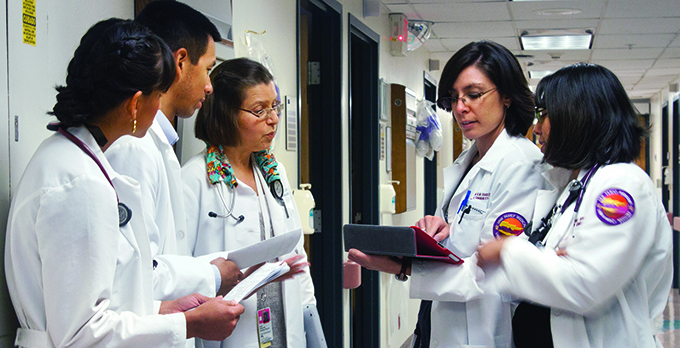The neurological system—a complex web of cells, tissues, and organs—controls how the human body operates. It receives and processes information from the senses and sends signals to regulate the muscles, breathing, and other vital processes from head to toe.
There are many ways this system can go awry, from common conditions such as stroke or migraine to rare disorders such as Guillain-Barré Syndrome or amyotrophic lateral sclerosis (ALS). If you need to stay in the hospital for a neurological condition, support from a dedicated specialist can improve your care.
Neurologists are medical experts who specialize in diagnosing and treating conditions of the neurological system. A neurohospitalist is a type of neurologist who specializes in inpatient neurology. The neurohospitalist provides dedicated care for patients admitted to the hospital with a primary neurological diagnosis.
For medical trainees, the benefits of UNM Health Sciences Center’s neurohospitalist program are significant. As the state’s only academic medical center, we provide care for a wide variety of neurological conditions in patients from across New Mexico.
Neurohospitalist programs like ours enhance patient care, improve hospital workflows, and provide important training opportunities for the next generation of neurologists.
What Is a Neurohospitalist?
Neurohospitalists provide comprehensive neurological care, collaborate with other care teams, and manage complications of disease. As a central point of contact for the Neurology Department, neurohospitalists help inpatients get the highest quality, most efficient neurological care.
A neurohospitalist focuses on:
- Acute neurological care: Specialized care for urgent conditions such as epilepsy, head trauma, stroke, and others.
- Collaboration and teamwork: As part of the multidisciplinary team, we collaborate with other hospital departments and staff to develop comprehensive treatment plans.
- Management of complex conditions: Medical oversight of treatment for complicated neurological concerns including coma, critical illness polyneuropathy, complications related to organ transplant, and more.
Related reading: ‘Hispanic Mutation’: Why New Mexico Is an Epicenter for Stroke, Migraine and Seizures
Improving Patient Care and Clinical Workflows
There are many different neurological conditions, and some are quite rare. The neurohospitalist’s expertise plays a crucial role in guiding patient care. Often, neurohospitalists are called on to make a diagnosis based on clinical observations that we can make even before tests can detect a problem.
For example, in the case of a patient suspected of having Guillain-Barré Syndrome, a neurohospitalist is trained to recognize weakness in the breathing muscles before laboratory tests such as arterial blood gas (ABG) show measurable changes. Hands-on expertise from a dedicated neurohospitalist enables us to intervene sooner, which means better outcomes for our patients.
Our patients take comfort in knowing UNM Health Sciences Center neurohospitalists are on their team. We can answer their questions, no matter how specific or detailed. Because our time is dedicated to patients in the hospital, we have longer to spend with them, too. This helps patients and their families better understand the diagnosis and feel comfortable with the treatment plan.
Related reading: Unlocking Efficiency: How a New Clinic Workflow Revealed More Face Time for Patients and Providers
Supporting a Transition to Long-Term Wellness
Being admitted to the hospital can feel like a one-time event, but for many patients with neurological conditions it’s one phase of a much longer journey. Neurological diseases often need long-term follow up and management.
For patients and families that are concerned about what happens after they leave the hospital, a neurohospitalist can help coordinate their care for a smoother transition. For example, we could connect a patient admitted with a severe seizure disorder with experts in the UNM Health Comprehensive Epilepsy Center to build a clear plan of care. Our expertise in both short- and long-term care management helps patients and families get support when they need it most.
Learning how to triage and coordinate care is an important component of medical training that can’t be learned from a textbook alone. UNM Health Sciences Center trainees get involved in long-term planning for complex neurological cases, learning how to navigate the full spectrum of patient care.
A Powerful Platform for Training
Neurology residents at UNM Health Sciences Center care for patients whose conditions range from simple to complex and who come from a wide range of socioeconomic and ethnic backgrounds. This diversity provides an unparalleled opportunity for trainees to gain high-volume, hands-on experience.
Working with neurohospitalists during their inpatient service time, trainees bridge the gap between theoretical knowledge and real-world clinical practice. Getting involved in the care of rare or complex neurological cases helps trainees become more comfortable in their skills for their future career.
Related reading: How a UNM HSC Resident’s Quest for Adventure Turned into a Neurology Career
Building a Healthier Future
For patients and their families, navigating a neurological diagnosis can be overwhelming. Neurohospitalists are here to help. Having a dedicated expert with a deep understanding of unique neurological conditions can bring more clarity and confidence to a hospital stay.
We work with trainees to bring this hands-on experience to the next generation of neurologists. With a high volume and diverse array of cases, UNM Health’s trainees get experience they need to hit the ground running, building a legacy of expertise for years to come.
To find out whether you or a loved one might benefit from neurology care, call 505-272-4866.

